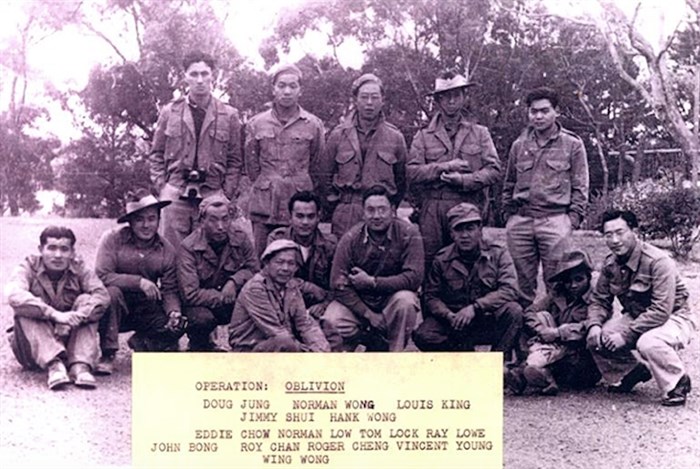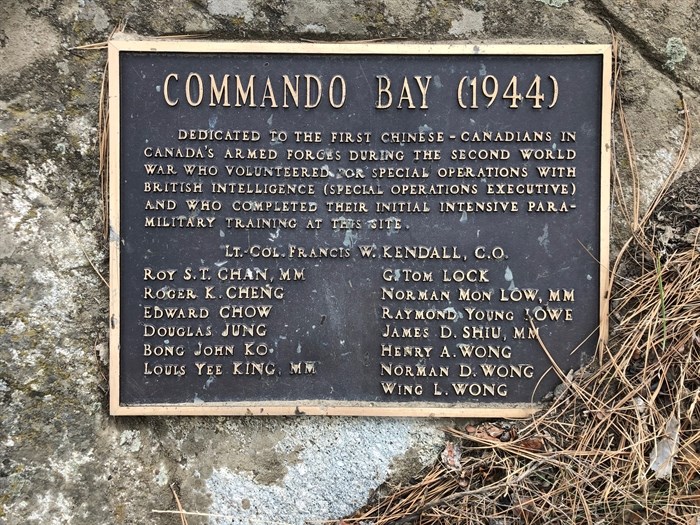
The members of Operation Oblivion; Douglas Jung, Jim Shiu, Norm Wong, Hank Wong, Louey King,
John Ko Bong, Ed Chow, Roy Chan, Wing Wong, Norm Low, Roger Cheng, Tom Lock, and Ray Lowe.
Image Credit: SUBMITTED / Rick Wong
July 22, 2024 - 7:00 PM
During the Second World War there were 13 Chinese Canadians who volunteered for the extraordinarily dangerous Operation Oblivion, and 80 years later Kelowna’s Chinese community remembered their courage.
Kelowna Chinese History Group and Chinese Freemasons of Kelowna organized an event on July 18 to honour and remember the Chinese Canadian soldiers who trained in Okanagan Lake’s Commando Bay and fought in the Second World War.
The groups also released a detailed account of the men who put their lives on the line for a country that oppressed them.
The year was 1944, the war in the Pacific was raging on, Chinese Canadians were subject to racist laws, and Commando Bay on Okanagan Lake was called Dunrobin’s Bay.
As Japan invaded countries in Southeast Asia, the Canadian military and the British Intelligence Agency needed soldiers who could blend in with populations under attack.
Chinese Canadians were treated as second-class citizens. They couldn’t vote, become citizens, work in various well-paying fields, or swim in public pools in B.C.
British Intelligence decided Chinese Canadians were the best candidates for dangerous, covert missions against the Japanese military in Asia.
Major Francis Woodley Kendall, a Vancouverite from Mainland China, was put in charge of recruiting Chinese Canadians as spies under a branch known as Force 136.
READ MORE: Soldiers trained on Okanagan Lake helped pave the way for Chinese rights in Canada
In total, 600 Chinese Canadians decided to fight for Canada in the war despite the hatred and racism embedded in Canadian laws and society.
Operation Oblivion was a mission to send Chinese Canadian soldiers to Southeast Asia and help local populations fight the Japanese through covert operations, sabotage and training.
Major Kendall recruited 13 soldiers for Operation Oblivion and decided to train them in Dunrobin’s Bay, now called Commando Bay, because it was remote and unforgiving terrain.
The 13 soldiers who went through the rigorous training in Commando Bay were: Douglas Jung, Jim Shiu, Norm Wong, Hank Wong, Louey King, John Ko Bong, Ed Chow, Roy Chan, Wing Wong, Norm Low, Roger Cheng, Tom Lock and Ray Lowe.
The warriors were taught guerrilla tactics such as bare hand fighting, light weapons handling, gunpowder and demolition, medical skill, silent killing, sabotage, jungle patrols, radio operation, telegraphy, tracking, silent swimming and more.
The men trained from 6 a.m to 9 p.m. and their only breaks were fruit picking at neighbouring orchards, and they were rewarded with fresh peaches.
The soldiers were told they faced near certain death on their deployment, and harsh treatment as spies if captured by the enemy, but they went anyway.
After months of brutally intense comprehensive training, the members of Operation Oblivion parachuted into numerous jungle battlefields where they rescued prisoners of war, recruited locals to fight the Japanese, delivered weapons and ammunition to locals and gathered intelligence.
Following the war, in 1946, Louey King, Norman Low, Roy Chan and James Shiu were awarded Military Medals for their exploits in the Pacific. Dunrobin's Bay was renamed Commando Bay because of Operation Oblivion.
READ MORE: The secret history of Okanagan Lake's Commando Bay
These soldiers, and all Chinese Canadian veterans, have been credited with changing the fate of Chinese Canadians. In 1945, Chinese Canadian veterans were allowed to vote, in 1948 all Chinese Canadians had the right to vote. It took until 1967 for Chinese immigration to be placed on an equal basis with other nationalities.
This past Thursday, 80 years after they signed up to fight, the Kelowna Chinese History Group, Chinese Freemasons of Kelowna, and local historians, gathered around a plaque in Commando Bay to recount the warriors’ bravery and their contribution to the advancement of civil rights in Canada.

The placard dedicated to the 13 Chinese-Canadians who trained in Commando Bay in 1944.
(MARSHALL JONES / iNFOnews.ca)
“The 80th anniversary event served as a poignant reminder of the 13 Chinese-Canadian soldiers' contributions to both the war effort and the fight for equal rights. The legacy of these brave individuals continues to inspire and shape the community, reminding us of the significant strides made in civil rights due to their courage and dedication,” the group wrote in a press release.
Click here to learn more about the operatives.
To contact a reporter for this story, email Jesse Tomas or call 250-488-3065 or email the editor. You can also submit photos, videos or news tips to the newsroom and be entered to win a monthly prize draw.
We welcome your comments and opinions on our stories but play nice. We won't censor or delete comments unless they contain off-topic statements or links, unnecessary vulgarity, false facts, spam or obviously fake profiles. If you have any concerns about what you see in comments, email the editor in the link above. SUBSCRIBE to our awesome newsletter here.
News from © iNFOnews, 2024